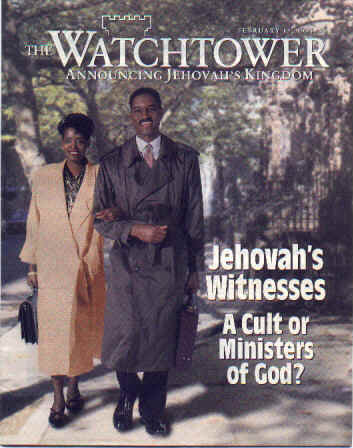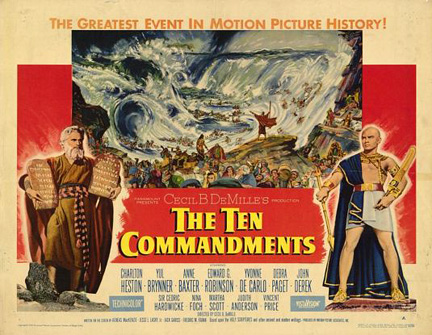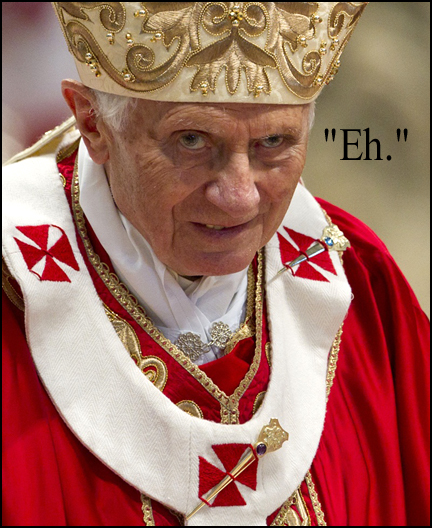 I wasn't raised as a Jehovah's Witness. The church I grew up in considered itself "nondenominational," though it was part of a large collective of members all across the world that called themselves the Body of Christ. Like every other religious group, we knew we were special and that everyone else got it wrong. Indeed, we had many beliefs that I thought were unique to us. Much later -- after I left it all -- I learned more about the Jehovah's Witnesses, and -- whaddaya know -- they had many of those same weird doctrines. Was I a secret Jehovah's Witness without knowing it?
I wasn't raised as a Jehovah's Witness. The church I grew up in considered itself "nondenominational," though it was part of a large collective of members all across the world that called themselves the Body of Christ. Like every other religious group, we knew we were special and that everyone else got it wrong. Indeed, we had many beliefs that I thought were unique to us. Much later -- after I left it all -- I learned more about the Jehovah's Witnesses, and -- whaddaya know -- they had many of those same weird doctrines. Was I a secret Jehovah's Witness without knowing it?Here is a (not comprehensive, but pretty decent) list of beliefs that my church and the Jehovah's Witnesses shared. It will give you an idea of what I used to consider the most important stuff in my life. Behold:
Trinity -- There is neither a trinity nor a "oneness." God the Father is a spirit but also a "person," an intellect. The Son of God is another spirit-type person who eventually came to earth as a human named Jesus. The Holy Ghost isn't a "person" but instead is some sort of power of God or something like that. More like The Force. You can talk to the Father and the Son, but you can "have" the Holy Ghost. Jesus was filled with the Holy Ghost from birth, so he had powers that other humans didn't have (though, after he died, we were allowed to receive that power). Two persons, one "thing": none of them a part of each other.
Jesus -- The Son of God (before he was the human Jesus) was the first creation of God. God then created nothing else, which is why the Son is the "Alpha and Omega, the beginning and the end." The Son is the one who created the universe and is the one who has a personal relationship with you. God is only gotten to through the son. The Son appears in the Bible in his pre-Jesus form as the angel Michael, the concept of Wisdom, and the concept of the Word.
The 144,000 -- Only 144,000 people will reach "perfection" and enter Heaven. You don't just go to Heaven because you're a good person who dies. These 144,00 are called the Bride of Christ and will serve as the government for the eventual New Earth, an earth (this same earth we're on now) which will always have humans and which will eventually be free of sin, making the world free of death, disease, etc. The Bride members will be able to go back and forth between Heaven and Earth. Many or most of this number already exist, so seats are limited.
The Resurrection -- Eventually, those who have died will get another chance, in a bodily resurrection, to do good and live on the New Earth as immortal humans. These will be the people who make the earth look the way God intended in the first place, before the Fall. You only have one shot, however, in this first life to make the 144,000.
Satan -- Satan and his fellow fallen angels torment humans and try to make them turn from God. But, one day, Satan will be bound for one thousand years, then unleashed again, then eventually destroyed for good (along with his underlings) in the Lake of Fire (which was created for this purpose and is not to be confused with Hell).
Hell -- There is a Heaven, but there is no Hell. God is happy to reward you for doing well, but he's not going to punish you for making poor decisions, since you didn't ask to be born, after all. Instead, if you're bad, you just die and that's it. The soul, therefore, is not necessarily immortal, but can be snuffed out like a candle.
Eve -- The wife of Adam was actually an evil dark-haired woman created by Satan to torment and destroy the first human. However, the Son of God managed to make her good (and blonde) through the power of the Holy Ghost. Still, Satan had a trick up his sleeve and turned himself into an old beggar woman who offered Eve a poisoned apple, which she took and also gave to Adam, causing them to slowly die and also discover their genitals. (Okay, that's actually a mash-up of the Eden story, Snow White, and the Smurfs, but I had you going for a while.)
So there. Obviously, of course, I wasn't really a Jehovah's Witness. Unlike them, I celebrated all the holidays, would have taken a blood transfusion if needed, didn't go door to door with Watchtower magazine, etc. But it's odd to me that these two belief systems that seem to have nothing to do with each other arrived at the same specific conclusions. And maybe it's the remnants of my brainwashed mind talking, but I still think that -- as a comic book style mythological system -- the above still makes more sense than most "mainstream" Christian doctrines.
 Many are taught that "The Ten Commandments" are ten simple "thou shalt nots" that spell out how to live your life, written by God himself on tablets of stone. But, in addition to the Commandments having little to do with our lives and modern sense of ethics, there are other problems and confusions that occur concerning the commandments when you examine the text of the Bible. There are more than ten commandments, first of all. There are hundreds. And it's difficult to say which ones, if any, were written on stone. The Bible does eventually give us a list of ten commandments, but they are not the popular ones we sorta kinda think we know. There is much to sort through and discuss concerning this topic, so we'll walk through it slowly.
Many are taught that "The Ten Commandments" are ten simple "thou shalt nots" that spell out how to live your life, written by God himself on tablets of stone. But, in addition to the Commandments having little to do with our lives and modern sense of ethics, there are other problems and confusions that occur concerning the commandments when you examine the text of the Bible. There are more than ten commandments, first of all. There are hundreds. And it's difficult to say which ones, if any, were written on stone. The Bible does eventually give us a list of ten commandments, but they are not the popular ones we sorta kinda think we know. There is much to sort through and discuss concerning this topic, so we'll walk through it slowly.
 Now that the pope is retiring, it's time to bring in some changes to the papacy and the Catholic Church in general to make it more up to date for the 21st Century. Here are my Forty-Five Theses. (Martin Luther had just under a hundred. I'll go just under fifty, since I know we have less time on our hands than they did in 1517, what with all the screen-based activities we have to do.)
Now that the pope is retiring, it's time to bring in some changes to the papacy and the Catholic Church in general to make it more up to date for the 21st Century. Here are my Forty-Five Theses. (Martin Luther had just under a hundred. I'll go just under fifty, since I know we have less time on our hands than they did in 1517, what with all the screen-based activities we have to do.)